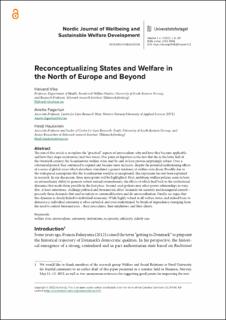Reconceptualizing States and Welfare in the North of Europe and Beyond
Journal article
Published version
Permanent lenke
https://hdl.handle.net/11250/3036734Utgivelsesdato
2022Metadata
Vis full innførselSamlinger
Originalversjon
Vike, H., Fagertun, A. & Haukelien, H. (2022). Reconceptualizing States and Welfare in the North of Europe and Beyond. Nordic Journal of Wellbeing and Sustainable Welfare Development, 1(1), 6-20. https://doi.org/10.18261/njwel.1.1.2Sammendrag
The aim of this article is to explore the “practical” aspects of universalism; why and how they become applicable, and how they shape institutions (and vice versa). Our point of departure is the fact that the in the latter half of the twentieth century, the Scandinavian welfare states may be said to have proven surprisingly robust. Over a substantial period, they continued to expand and became more inclusive, despite the potential undermining effects of a series of global crises which elsewhere stimulated a general tendency of welfare state decay. Possibly due to the widespread assumption that the Scandinavian world is so exceptional, this expansion has not been explained in research. In our discussion, three main points will be highlighted: First, ambitious welfare policies seem to have an extraordinary ability to generate robust mutual commitments, the effects of which feed back to the institutional dynamics that made them possible in the first place. Second, such policies may affect power relationships in ways that, at least sometimes, challenge political and bureaucratic elites’ demands for austerity and managerial control – precisely those demands that tend to initiate re-commodification and de-universalization. Finally, we argue that this dynamic is closely linked to individual autonomy. While highly valued in all welfare states, and indeed basic to democracy, individual autonomy is often curtailed, and even undermined, by bonds of dependency emerging from the need to control bureaucracies – their procedures, their employees, and their clients.

